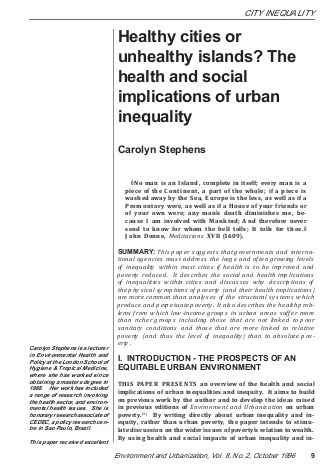
This paper suggests that governments and international agencies must address the large and often growing levels of inequality within most cities if health is to be improved and poverty reduced. It describes the social and health implications of inequalities within cities and discusses why descriptions of the physical symptoms of poverty (and their health implications) are more common than analyses of the structural systems which produce and perpetuate poverty. It also describes the health problems from which low-income groups in urban areas suffer more than richer groups including those that are not linked to poor sanitary conditions and those that are more linked to relative poverty (and thus the level of inequality) than to absolute poverty.
Resource collections
- UN Habitat - Urban Response Collection
- Urban Response - Urban Crisis Preparedness and Risk Reduction
- Urban Response Collection - Community Engagement and Social Cohesion
- Urban Response Collection - Economic Recovery
- Urban Response Collection - Environment and Climate Change
- Urban Response Collection - Housing, Land and Property
- Urban Response Collection - Urban Crisis Response, Recovery and Reconstruction
- Urban Response Collection - Urban Resilience